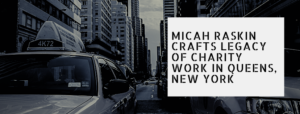Micah Raskin Crafts Legacy of Charity Work in Queens, New York


Micah Raskin professional poker player in NY has impacted his local Queens community through various outreaches, crafting a legacy of charity work in his borough over the years.
Few professional poker players have earned the credentials and success that Micah Raskin has in just over a decade of play. He made his first live-event cash in 2007 and has been among the country’s top poker earners ever since. In the very beginning of his professional career, just four years in, Micah Raskin had already made it to sixteen final tables, cashed in dozens of times, won four major events, brought home money at the WSOP three times, and earned more than a million dollars in this period.
From then on, he played in some of the world’s top poker tournaments including Bellagio Weekly Tournament, the Borgata Summer Poker Open, and the World Series of Poker event. Micah Raskin has also played the NAPT in Los Angeles, the River Guaranteed Poker Series, the PokerStars Caribbean Adventure, and the $10,000 NLHE 6-Max High Roller event in addition to many others.
Over the years, Micah Raskin used his earnings and success to establish or contribute to a number of outreaches and community-building programs that strengthen neighborhoods in Queens.
Micah Raskin Volunteers with Local Soup Kitchens
Micah Raskin has long held a passion for food and has shared it with his parents and his family who he often cooks meals for. He says the gift of quality food is something that people may not be able to get on their own, but undoubtedly need in order to survive. Cooking for others satisfies an urge to supply others with nourishment and Raskin says it has plenty of its own special benefits for the cooks.
After sharing his passion with loved ones for years, Micah Raskin used his passion for food to help in the nonprofit realm by volunteering with his local soup kitchen. At these locations, volunteers can purchase, supply, cook, and serve meals to those community members who need it most, such as homeless, teenage runaways, and those in extreme poverty among others.
“Millions of people go hungry in our country every day–children, adults, elderly, you name it,” says Micah Raskin. “Soup kitchens provide food and nourishment to these individuals and offer a place to escape the elements, a place to get warm in the winters or cool off in the summers with a roof over their heads.”
Soup kitchens can be found in every major city and are always in need of help, whether through volunteer work, food donations, or monetary donations. People like Micah Raskin help out along the entire process to make sure the kitchen continues providing as much support to their communities as they can.
Micah Raskin Helps Develop After-School Program
“Students who have the resource of an after-school program are able to perform better in the classroom because they have fewer negative factors impacting their days,” says Micah Raskin. “Professional leaders in these environments can encourage students to do work in a safe place and can usually offer tutoring services to help them through their schoolwork if needed. This one-on-one time proves to be a benefit to students’ grades and can have a tremendous impact on their behavior as well.”
Micah Raskin has helped create an after-school program in Queens for grade school kids who may not have a safe or conducive environment to go to once school is over. After-school programs provide regular homework support for students and give them the opportunity to relax or be with friends. They don’t have to worry about poverty and living in overcrowded environments there and can receive more attention and support from adults. This, in turn, helps their overall behavior and results in far fewer bullies or aggressive classmates in school.
“After-school programs provide academic support and positive youth development that
translates into healthier, happier, and better-performing students of all levels,” says
Micah Raskin. “We’re in dire need of more of these programs in public school
throughout the country, but especially in those neighborhoods with high numbers of at-
risk students.”
In addition, these types of programs can actually teach and encourage healthier eating habits from students. Often, a lack of education or else a lack of resources often mean students go home to eat junk food or other non-nutritious meals that can impede their growth or harm their overall health. In after-school programs, students have the potential to learn healthier habits like
increased physical activity and improved nutrition, which may result in reduced obesity levels. Some after-school programs partner with organizations such as the CACFP that provide nutritious food, drinks, and snacks to students who may not be able to get them elsewhere.
Micah Raskin Spreads Solidarity and Community in His Neighborhoods
Living in Queens, NY, Micah Raskin has found plenty of opportunities to get involved in his community, empower his friends and neighbors, and donate time, money and resources to improve the lives of those in the borough. He’s developed a high reputation in the area for his charity work and hopes to inspire those around him to make greater efforts to help out, leading them by example.
Besides directly funding and helping to uphold various outreach programs in Queens, he also encourages friends, peers, relatives and others in his life to volunteer in any capacity they can. He acknowledges that many of these programs–such as soup kitchens and homeless shelters–tend to be understaffed and need support from their community to make a bigger difference.
In his spare time, Micah Raskin spends as much time in his community as he can, encouraging and uplifting others as needed and responding to local concerns and issues with wisdom and support. He mentions that the way he volunteers doesn’t have to be how others do it, either. He prompts them instead to look within to their own passions and discover available outlets in their communities that answer that calling.
“It’s hard to believe that people in our country go to bed starving, face violence or a lack of resources at home, don’t have an education program that fits their unique needs and challenges, or various other seemingly easily solvable problems,” says Micah Raskin. “Everyone likes to shift blame and responsibility, but the truth is we just need more people getting out in their communities and helping out. There are plenty of ways for people to volunteer. They just need to look to community boards or local nonprofit groups who share their needs. The point is to go out and find where the people in your city need help the most. Any little bit of volunteer work can help out.”

